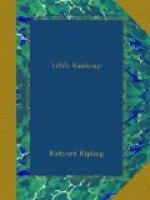V
It will be long ere the Khusru Kheyl forget their night attack on the lowland villages. The Mullah had promised an easy victory and unlimited plunder; but behold, armed troopers of the Queen had risen out of the very earth, cutting, slashing, and riding down under the stars, so that no man knew where to turn, and all feared that they had brought an army about their ears, and ran back to the hills. In the panic of that flight more men were seen to drop from wounds inflicted by an Afghan knife jabbed upwards, and yet more from long-range carbine-fire. Then there rose a cry of treachery, and when they reached their own guarded heights, they had left, with some forty dead and sixty wounded, all their confidence in the Blind Mullah on the plains below. They clamoured, swore, and argued round the fires; the women wailing for the lost, and the Mullah shrieking curses on the returned.
Then Khoda Dad Khan, eloquent and unbreathed, for he had taken no part in the fight, rose to improve the occasion. He pointed out that the tribe owed every item of its present misfortune to the Blind Mullah, who had lied in every possible particular and talked them into a trap. It was undoubtedly an insult that a Bengali, the son of a Bengali, should presume to administer the Border, but that fact did not, as the Mullah pretended, herald a general time of license and lifting; and the inexplicable madness of the English had not in the least impaired their power of guarding their marches. On the contrary, the baffled and out-generalled tribe would now, just when their food-stock was lowest, be blockaded from any trade with Hindustan until they had sent hostages for good behaviour, paid compensation for disturbance, and blood-money at the rate of thirty-six English pounds per head for every villager that they might have slain. ’And ye know that those lowland dogs will make oath that we have slain scores. Will the Mullah pay the fines or must we sell our guns?’ A low growl ran round the fires. ’Now, seeing that all this is the Mullah’s work, and that we have gained nothing but promises of Paradise thereby, it is in my heart that we of the Khusru Kheyl lack a shrine whereat to pray. We are weakened, and henceforth how shall we dare to cross into the Madar Kheyl border, as has been our custom, to kneel to Pir Sajji’s tomb? The Madar men will fall upon us, and rightly. But our Mullah is a holy man. He has helped two score of us into Paradise this night. Let him therefore accompany his flock, and we will build over his body a dome of the blue tiles of Mooltan, and burn lamps at his feet every Friday night. He shall be a saint: we shall have a shrine; and there our women shall pray for fresh seed to fill the gaps in our fighting-tale. How think you?’
A grim chuckle followed the suggestion, and the soft wheep, wheep of unscabbarded knives followed the chuckle. It was an excellent notion, and met a long felt want of the tribe. The Mullah sprang to his feet, glaring with withered eyeballs at the drawn death he could not see, and calling down the curses of God and Mahomed on the tribe. Then began a game of blind man’s buff round and between the fires, whereof Khuruk Shah, the tribal poet, has sung in verse that will not die.




